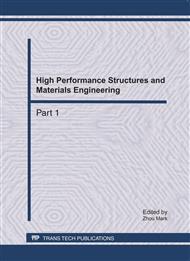p.1708
p.1716
p.1721
p.1725
p.1729
p.1733
p.1739
p.1743
p.1747
Hot Deformation Behavior of 7075 Aluminum Alloy Bar Compressed with Different Orientation at Elevated Temperature
Abstract:
Hot compression tests of 7075 aluminum alloy were carried out on the Gleeble-1500 thermal simulation machine at strain rates of 0.1s-1 ,1 s-1 and at temperatures of 320°C,400°C,480°C. The compression direction are aligned at 0°,45°and 90°to the axis direction of the bar. Microstructure was studied using Optical Microscopy. The results show that the true stress of all three specimen increases with the decrease of temperature and the increase of strain rates. The true stresses rose rapidly to peak value and then held constant or decreased with the increase of the true strains at different deformation conditions. The yield strength of the specimens in 0° to the axis direction is higher than that of 90°, and 45° specimen has the lowest yield strength at different deformation conditions, which could be attributed to the elongated grain structures of the bar.
Info:
Periodical:
Pages:
1729-1732
Citation:
Online since:
March 2011
Authors:
Keywords:
Price:
Сopyright:
© 2011 Trans Tech Publications Ltd. All Rights Reserved
Share:
Citation:


